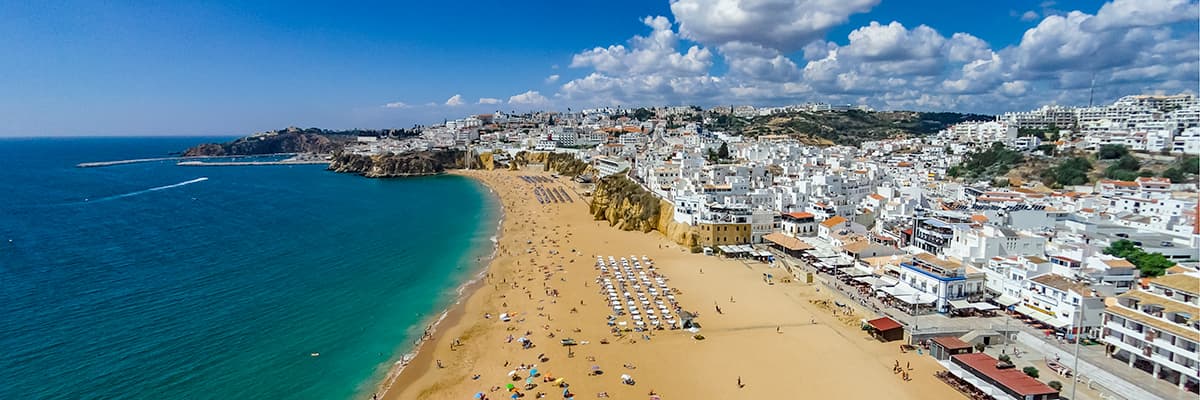wb_sunnyWeather & Climate The Sunniest Place in Europe

The proximity of the Mediterranean Sea greatly influences the Algarvian climate. Summers are hot and dry, but not suffocating thanks to the Atlantic Ocean, and winters are mild with hardly any rain (50 days with rain and 500 mm on average each year), combined with very inviting springs and autumns. The Algarve is famous for enjoying over 300 days of sun and 3000 hours of sunlight on average per year.
The Climate in Albufeira
Winter
Winters are mild in the Algarve. There is very occasionally snowfall up in the mountains at Monchique, but It rarely freezes in Albufeira and daytime temperature is usually above 12ºC and fells warmer under the sunlight. Heating is welcome at night but in the daytime, walks on the beach are enjoyable between the few rainy days. It's during late January and early February that the almond trees blossom and cover the area with white flowers.
Spring
Spring starts early in the Algarve, March and April normally still bring some rain and instability, but the sun begins to warm the atmosphere and nature starts to bloom all around. The use of a coat is still necessary at night but during the day many are seen wearing short-leaf shirt only. Tourists, national and foreigners, will start filling the region on Easter and Spring Break and high season begins then.
Summer
From June on, rain nearly completely stops and, together with September, are the most pleasant months of the year. Undoubtfully the warmest months are July and August where air temperature can reach 40ºC, but thanks to an almost ever-present sea breeze the heat is bearable for most. Summer is naturally the most popular season for tourism which can be overwhelming at its peak. Sea temperature can get up to 23/24ºC late August and will be warmer to the east where it is closer to the Mediterranean Sea.
Autumn
October uses to be a continuation of the weather from late summer. Beach is still enjoyable, and temperatures are still relatively high. Autumn feeling and need for warmer cloth only appears late November where rain is expected more frequently and continues through December. Alternation between anticyclonic and Atlantic depression will influence the wind and rainfall
Yearly statistics
Taking care in the Sun
 As can be observed, during Summer, the temperature in the Algarve is very high (it can go over 40ºC/100ºF exceptionally) and the periods of sun are long. It is common knowledge that excess sun can cause illnesses such as skin cancer.
As can be observed, during Summer, the temperature in the Algarve is very high (it can go over 40ºC/100ºF exceptionally) and the periods of sun are long. It is common knowledge that excess sun can cause illnesses such as skin cancer.
The safest procedure is to use plenty of high-factor sunscreen, especially on children. A hat is an indispensable accessory, as are a good pair of sunglasses. It is advisable to avoid exposure to the sun during its strongest point in the day, between midday and 3 o'clock in the afternoon. In the case of sunburns or sunstroke, do seek medical attention.